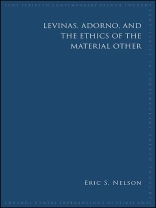A provocative examination of the consequences of Levinas’s and Adorno’s thought for contemporary ethics and political philosophy.
This book sets up a dialogue between Emmanuel Levinas and Theodor W. Adorno, using their thought to address contemporary environmental and social-political situations. Eric S. Nelson explores the ‘non-identity thinking’ of Adorno and the ‘ethics of the Other’ of Levinas with regard to three areas of concern: the ethical position of nature and ‘inhuman’ material others such as environments and animals; the bonds and tensions between ethics and religion and the formation of the self through the dynamic of violence and liberation expressed in religious discourses; and the problematic uses and limitations of liberal and republican discourses of equality, liberty, tolerance, and their presupposition of the private individual self and autonomous subject. Thinking with and beyond Levinas and Adorno, this work examines the possibility of an anarchic hospitality and solidarity between material others and sensuous embodied life.
Cuprins
Acknowledgments
Introduction: On the Way to an Ethics of Material Others
Part I: After Nature: Ethics, Natural History, and Environmental Crisis
1. Toward a Critical Ecological Model of Natural History
2. Natural History, Nonidentity, and Ecological Crisis
3. Communicative Interaction or Natural History? Aesthetics, Ethics, and Nature
4. The Trouble with Life: Life-Philosophy, Antinaturalism, and Transcendence in Levinas
5. An Ethics of Nature at the End of Nature
Part II: Unsettling Religion: Suffering, Prophecy, and the Good
6. Religion, Suffering, and Damaged Life: Nietzsche, Marx, and Adorno
7. The Disturbance of the Ethical: Kierkegaard, Levinas, and Abraham’s Binding of Isaac
8. Ethics between Religiosity and Secularity: Kierkegaard and Levinas
9. Prophetic Time, Materiality, and Dignity: Bloch and Levinas
10. Ethical Imperfectionism and the Sovereignty of Good: Levinas, Løgstrup, and Murdoch
Part III: Demanding Justice: Asymmetrical Ethics and Critical Social Theory
11. Equality, Justice, and Asymmetrical Ethics
12. The Pathologies of Freedom and the Promise of Autonomy
13. The Limits of Liberalism: Cosmopolitanism, Tolerance, and Asymmetrical Ethics
14. Recognition, Nonidentity, and the Contradictions of Liberalism
Epilogue: Nourishing Life, Unrestricted Solidarity, and the Good
Notes
Bibliography
Index
Despre autor
Eric S. Nelson is Professor of Philosophy at the Hong Kong University of Science and Technology. He is the coeditor (with John E. Drabinski) of Between Levinas and Heidegger, also published by SUNY Press, and the author of Chinese and Buddhist Philosophy in Early Twentieth-Century German Thought.












